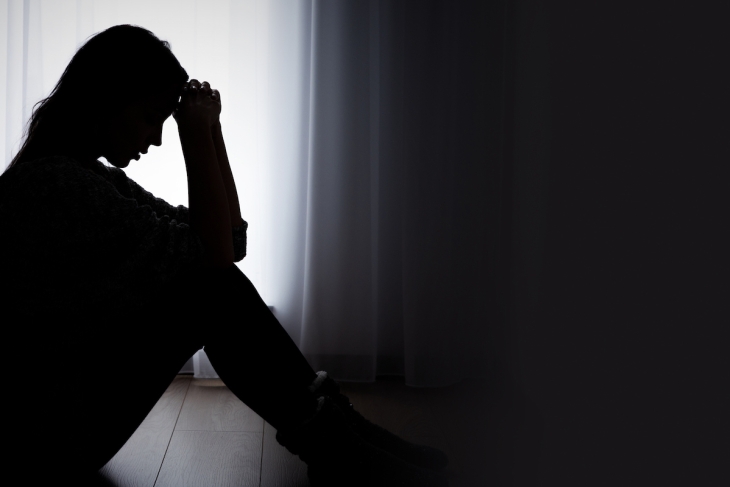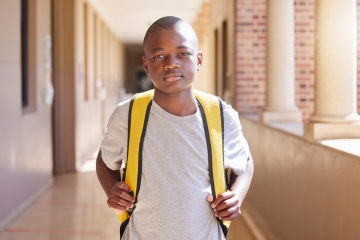We tend to think of schools as simply the place where kids go to learn, but they aren’t only about education. They provide many essential services to students and families, including nutrition, healthcare—and even if simply as a byproduct of mandatory attendance for educational purposes, giving parents a place to send their children while they’re at work. According to a recent working paper by three Indiana University researchers, the latter service is an important one for parents, whose mental health outcomes may actually depend on having access to schools as a source of childcare.
The researchers leveraged pandemic-era school closures to determine their effect on parental mental health. They measured school closures using data from SafeGraph, which uses cellphone mobility patterns to measure visits to various locations—including schools. They restricted the data to include only daily visits to schools between September 2017 and December 2021, and used these data to calculate a monthly school mobility measure that reflected how severe the pandemic’s disruption was to a given school. The SafeGraph sample covered nearly 87 percent of the 98,469 public schools identified by NCES in 2019–20.
To quantify parental mental health, the researchers focused on two (albeit, questionable) measures: prescription antidepressant use and alcohol purchases. Data on the former came from Optum’s Clinformatics Data Mart Database, which contains retail pharmacy claims data for 20 percent of the commercially insured U.S. population. Monthly alcohol purchase data was drawn from the Nielsen Retail Scanner Data, which covers over 50 percent of total U.S. grocery and drug store sales.
For an initial descriptive analysis, the researchers used their monthly school mobility measure to divide the zip codes of sample schools into quartiles based on the severity of their school closures, where Quartile 1 represented zip codes with the lowest level of closures and Quartile 4 represented those with the highest.
They found, first, that maternal antidepressant prescriptions increases were larger in zip codes where school closures were more severe; prescriptions increased by about 4.5 percent in zip codes that fell into Quartiles 3 or 4, indicating higher levels of closures, while the increases for first- and second-quartile zip codes were below 1 percent.
In subsequent regression analyses that controlled for factors such as unemployment rates and Covid-related deaths, the researchers found their school mobility measure to be associated with statistically significant increases in both maternal prescription antidepressant use and county-wide alcohol purchases during school closures, as compared to pre-pandemic levels. As might be expected, the largest increases occurred at the start of the pandemic (between March and August of 2020), when nearly all schools were closed, with new maternal prescription antidepressant use rising by 1.5 percent and alcohol purchases by 2 percent for the full sample.
Antidepressant use did not change among mothers who had a prior history of mental health conditions and prescription antidepressant usage. In addition, a model that separated schools by grade level showed that elementary school closures were significantly associated with increases in alcohol purchases, while middle and high school closures had no statistically significant link, suggesting that the mental health of parents with younger children was most strongly impacted by school closures. This is, of course, assuming the soundness of the outcome measures, which are somewhat questionable.
The researchers also ran “placebo tests” in an attempt to determine whether the increase in alcohol purchases truly indicated a form of “self-medication” or if it had another explanation, such as an increase in the demand for all household products during the pandemic. Estimating the demand for feminine hygiene products and baby care products, they found no evidence to suggest that demand increased specifically during school closure periods. Thus, the researchers concluded that the increase in alcohol purchases did indeed indicate increased “self-medication” by parents during pandemic-related school closures, as hypothesized.
While these findings may provide valuable insights into the role that school systems play in maintaining parental mental health, the study’s results should be interpreted with some caution. The pandemic caused mental and emotional stress for many people, regardless of whether they had children impacted by school closures. In addition, the measures that the researchers used to reflect parental mental health were somewhat flawed. While alcohol purchases may indicate self-medication in some cases, this cannot be confirmed without further information on the motivations of parents. Alcohol purchases likely spiked for a variety of reasons during the pandemic, including the fact that many adults had more time at home and fewer obligations during pandemic-related shutdowns. This measure is also limiting in some ways. For example, for parents who do not drink, alcohol purchases would not have increased during the study period—but this does not mean that these parents did not experience mental health-related challenges.
Nonetheless, the study does provide support for the idea that public schools play a crucial role in maintaining parental mental health by acting as a form of childcare, and may also have some interesting implications in the realm of school choice. In the wake of the pandemic, virtual schooling, homeschooling, and other school choice alternatives that keep children at home have grown in popularity, leading many to believe that the future of education may be characterized by much high levels of participation in such alternatives. However, the findings outlined here suggest that at-home alternatives to schooling may instead remain relatively niche because public schools (and, presumably, any of their in-person alternatives) provide much more than just education to students. They are essential in promoting the health and well-being of students, families, and communities.
SOURCE: Sumedha Gupta, Dario Salcedo, and Kosali I. Simon, “School Closures and Parental Mental Health,” National Bureau of Economic Research Working Paper (May 2024).




